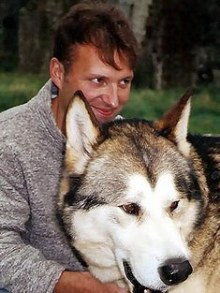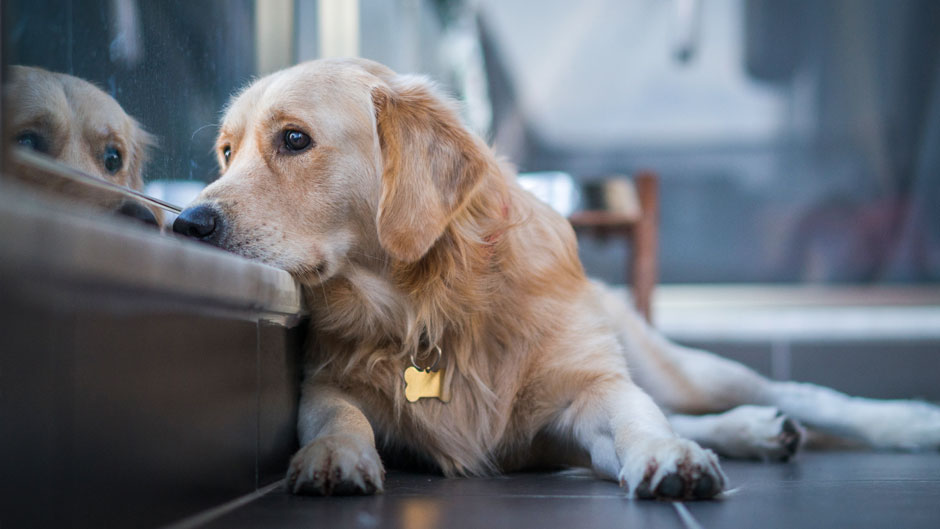From his experience raising a wolf dog hybrid, Mark Rowlands knows firsthand what can happen when animals—especially those prone to separation anxiety—are jilted from their accustomed routine.
On the ferry from Britain to Ireland, Rowlands left Brenin (Welsh for “King,” named for the pup’s lion color) alone in his parked car while he strolled the ferry’s top deck—until the announcement calling him to “return immediately.”

“Brenin had completely destroyed the inside of the car, there was nothing left that was recognizable—the gear stick gnawed, the seating ripped down, an incredible mess,” recalled Rowlands, professor and chair of the Philosophy Department in the College of Arts and Sciences.
One of the deckhands thought he was angry enough to harm the dog. But he had no such intention; instead, he explained to the man that “you can’t hold animals responsible for what they do.”
The experience dovetailed into philosophical research Rowlands was doing at the time and became grist for his first book on animals, “Animal Rights.” To date, Rowlands has authored 17 books, including the forthcoming “World on Fire: Humans, Animals and the Future of the Planet.”
“It all stemmed from a wolf dog eating my car,” he laughed.
While the anecdote is an extreme one, Rowlands—who emphasized that his knowledge of animals is limited to dogs and wolves—noted that pets are first and foremost creatures of habit and that an abrupt return to the office by some workers who have been working remotely for more than a year because of the coronavirus pandemic, is best managed in transition and phases.
“Dogs really like routine, and it’s clear why that would be because knowing what comes next is the only sort of power they have over their life,” he said. “We decide everything for them—when they’re fed, when we leave them and come back. Knowing what comes next is the only semblance of control that they have, and they get a bit upset when this goes.”
While Rowlands expects to continue working from home in the near future, at least part of the time, he has adopted the routine of taking his current furry friend, a German shepherd, out for morning exercise. He suggested other pet owners might do the same.
“As a general rule, a tired dog is a happy dog, so taking them out for a lot of exercise before you go to work is a good idea,” he said, noting that “it may be difficult to fit in, but it will make their lives a lot better.”
Rowlands recognized that some people are particularly connected to animals and suggested that a heightened sense of empathy is probably at play.
“Some people have a highly attuned sense of feeling with other beings, whether human or other,” he said. “It has to do with the ability to empathize, to project yourself in the mind of another, and to work out how things must be for them.”
This attunement may have its foundation in the philosophical notion of intrinsic value. While Rowlands does not fully embrace the belief that something has value in and of itself—and so does not derive its worth from us—in terms of caring for pets, the concept is essential.
“That’s a necessity for any pet owner,” he said. “To value a pet is to recognize that it’s an end in itself, that it has a life and has wants and needs that it needs met. This is going to require some restructuring of your life because now there are some things you can and cannot do because of your companion animal.”
Dog adoptions and sales have skyrocketed during the pandemic. Shelter, rescues, and breeders reported increased demand as consumers in the United States with children or home alone have sought to lessen their isolation with canine companions, according to a Washington Post article.
Not exactly the best reason to seek a pet, according to Rowlands.
“It will be a disastrous reason to acquire a pet to meet your own needs. It puts too much on the pet, and it doesn’t end very well when you’re doing it for your own needs,” he said. “People quickly tire of their pets. If you seek out a companion animal simply because you have certain needs and you’re not empathizing properly with that animal, you’re not recognizing it for what it is: a creature with needs and wants of its own, with ways of achieving happiness of its own. It’s an unhealthy way to relate to any animal.”
Even with service animals, which are nearly exclusively dogs, he pointed out that there are wonderful owners and others who fall short.
“The great owners recognize that the animal is a distinct being with needs of its own. It’s not simply there to meet your own needs,” he said. These owners give their dogs time off where they can do what they want, he explained.
“These things can be set up fairly or unfairly,” Rowlands said. “The really good service animal owners that I’ve known have been very fair and just people—and they behaved in this way toward their animals.”
Rowland’s forthcoming book “World on Fire” explores a range of topics, a principle one being the impact of food choice on global climate, extinction, and pandemics.
“You’ll find at the heart of all these things is this practice we have for raising and eating animals for food. And we can, to a considerable extent, ameliorate these problems if we stop doing that,” he said.

